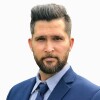Speakers Bureau
The Middle East Forum’s Speakers Bureau provides access to leading specialists available for both in-person and virtual events. We offer support in selecting the right topic and coordinating logistics, ensuring a seamless and impactful experience for your audience.
To book a speaker, click here.
Benjamin Baird is a public affairs specialist who organizes grassroots advocacy campaigns in support of Middle East Forum projects. He mobilizes constituencies to support MEF policy objectives, coordinates effective public pressure campaigns, and uses bold and creative techniques to disrupt the policy-making arena. Mr. Baird is a U.S. Army infantry veteran with a B.A. from American Military University. His writing can be found at National Review, New York Post, Jerusalem Post, and other prominent media outlets.
Jim Hanson is Chief Editor for the Middle East Forum. He previously served in U.S. Army Special Forces and conducted counterterrorism, counterinsurgency and foreign internal defense operations in more than two dozen countries. He is the author of several books including Winning the Second Civil War - Without Firing a Shot and Cut Down the Black Flag - A Plan to Defeat ISIS.
Winfield Myers is managing editor of the Middle East Forum and director of its Campus Watch project, which reviews and critiques Middle East studies in North American universities. He has taught world history and other topics at the University of Michigan, the University of Georgia, Tulane, and Xavier University of Louisiana. He was previously managing editor of The American Enterprise magazine and CEO of Democracy Project, Inc., which he co-founded. Mr. Myers has served as senior editor and communications director at the Intercollegiate Studies Institute and is principal author and editor of a college guide, Choosing the Right College (1998, 2001). He was educated at the University of Georgia, Tulane, and the University of Michigan.
Daniel Pipes, a historian, has led the Middle East Forum since its founding in 1994 and currently serves as chairman on the board of directors. He taught at Chicago, Harvard, Pepperdine, and the U.S. Naval War College. He served in five U.S. administrations, received two presidential appointments, and testified before many congressional committees. The author of 16 books on the Middle East, Islam, and other topics, Mr. Pipes writes a column for the Washington Times and the Spectator; his work has been translated into 39 languages. DanielPipes.org contains an archive of his writings and media appearances; he tweets at @DanielPipes. He received both his A.B. and Ph.D. from Harvard. The Washington Post deems him “perhaps the most prominent U.S. scholar on radical Islam.” Al-Qaeda invited Mr. Pipes to convert and Edward Said called him an “Orientalist.”
Gregg Roman is the executive director of the Middle East Forum, previously directing the Community Relations Council of the Jewish Federation of Greater Pittsburgh. In 2014, the Jewish Telegraphic Agency named him one of the “ten most inspiring global Jewish leaders,” and he previously served as the political advisor to the deputy foreign minister of Israel and worked for the Israeli Ministry of Defense. A frequent speaker on Middle East affairs, Mr. Roman appears on international news channels such as Fox News, i24NEWS, Al-Jazeera, BBC World News, and Israel’s Channels 12 and 13. He studied national security and political communications at American University and the Interdisciplinary Center in Herzliya, and has contributed to The Hill, Newsweek, the Los Angeles Times, the Miami Herald, and the Jerusalem Post.
Michael Rubin is a senior fellow at the American Enterprise Institute, where he specializes in Middle Eastern countries, particularly Iran and Turkey. His career includes time as a Pentagon official, with field experiences in Iran, Yemen, and Iraq, as well as engagements with the Taliban prior to 9/11. Mr. Rubin has also contributed to military education, teaching U.S. Navy and Marine units about regional conflicts and terrorism. His scholarly work includes several key publications, such as “Dancing with the Devil” and “Eternal Iran.” Rubin earned his Ph.D. and M.A. in history and a B.S. in biology from Yale University.
Alex Selsky is a senior adviser to the Israel Victory Project and serves on the board of directors of Middle East Forum-Israel. Mr. Selsky currently serves as a reserve major in the IDF Homefront Command emergency information unit. He is also a lecturer at the School of Politics and Journalism at Hadassah Academic College in Jerusalem. Previously, Mr. Selsky served as an advisor to Prime Minister Benjamin Netanyahu, spokesperson for the Israeli National Economic Council, member of the board of governors of the Jewish Agency for Israel, member of the executive board of the World Zionist Organization, and CEO of the International Israel Beytenu Movement.
He holds a B.A. in Business and an Executive Master of Public Policy from the Hebrew University of Jerusalem.
He holds a B.A. in Business and an Executive Master of Public Policy from the Hebrew University of Jerusalem.
Jonathan Spyer oversees the Forum’s content and is editor of the Middle East Quarterly. Mr. Spyer, a journalist, reports for Janes Intelligence Review, writes a column for the Jerusalem Post, and is a contributor to the Wall Street Journal and The Australian. He frequently reports from Syria and Iraq. He has a B.A. from the London School of Economics, an M.A. from the School of Oriental and African Studies in London, and a Ph.D. from the London School of Economics. He is the author of two books: The Transforming Fire: The Rise of the Israel-Islamist Conflict (2010) and Days of the Fall: A Reporter’s Journey in the Syria and Iraq Wars (2017).
Dexter Van Zile, the Middle East Forum’s Violin Family Research Fellow, serves as managing editor of Focus on Western Islamism. Prior to his current position, Van Zile worked at the Committee for Accuracy in Middle East Reporting and Analysis for 16 years, where he played a major role in countering misinformation broadcast into Christian churches by Palestinian Christians and refuting antisemitic propaganda broadcast by white nationalists and their allies in the U.S. His articles have appeared in the Jerusalem Post, the Boston Globe, Jewish Political Studies Review, the Algemeiner and the Jewish News Syndicate. He has authored numerous academic studies and book chapters about Christian anti-Zionism.




















